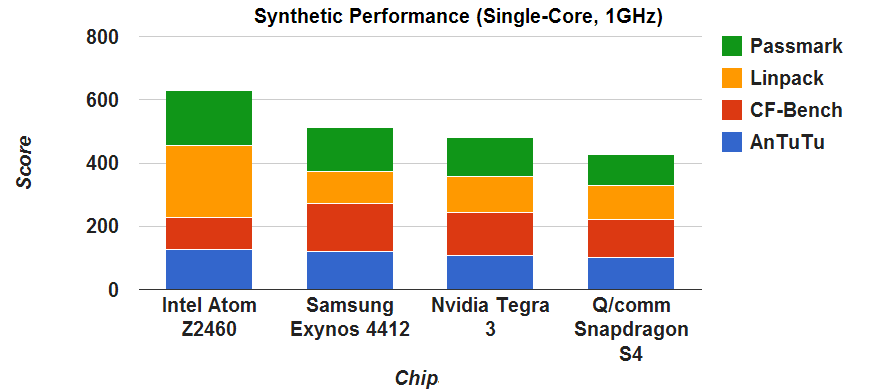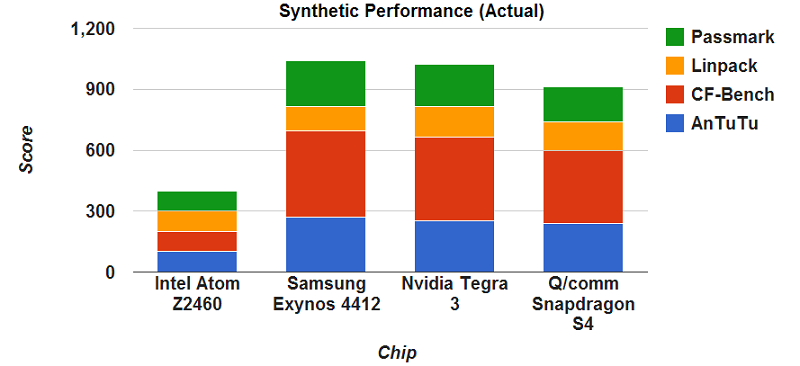Smartphone processor head-to-head: Intel Atom vs Nvidia Tegra 3 vs Samsung Exynos vs Qualcomm Snapdragon
We run the four processors through a battery of benchmarks to find out which one can claim to be the best overall...

Testing Methodology
A glance at the chips on test reveals a mixed batch: we've got single and quad-core parts running at speeds ranging from 1.4GHz up to 2GHz. A straightforward benchmark would reveal which chip is the fastest - and we'll be doing that as well. However, this would merely test the implementation, and we're looking to go significantly deeper.
We'll be running a battery of benchmarks across the devices and then correcting for the different specifications. This will help to reveal the overall efficiency of the design, rather than just the particular implementation in question.
Each processor will be put through three tests: a synthetic benchmark run, a real-world benchmark run, and a graphics benchmark run.
The correction will attempt to map each processor's benchmark scores onto a theoretical implementation running at 1GHz. The multi-threaded synthetic benchmark scores will additionally be corrected for a single-core chip, whilst the real-world results will retain their multi-core abilities - as, whatever manufacturers may claim, the majority of real-world uses are largely confined to a single processing thread.
To keep things fair, each handset on test is subjected to the same conditions: benchmarks are performed while the device is connected to USB for charging, and with a SIM card inserted connecting them to Vodafone's 3G network. This provides the same background level of activity as an average handset in use.
So how did they get on?
Synthetic Results
The synthetic benchmark results assume a theoretical implementation of each chip with one core running at 1GHz. The combined figures from four popular Android benchmarks are surprising as Intel's Atom chip comes out as the top dog.

Considering the Z2460 is Intel's first real crack at the mobile-friendly system-on-chip market, that's a stunning result. It also indicates that it isn't just the high 2GHz clock speed which keeps the Razr i ticking over nicely, but a fundamentally solid design.
Most surprising was the performance of Qualcomm's Snapdragon S4 Pro chip. Designed to compete with high-end processors like the Samsung Exynos, its performance running at a theoretical 1GHz was sub-par and it came last. Even Nvidia's Tegra 3, which is known more for its graphics performance than its compute performance, outdid Qualcomm's flagship processor.
Samsung's Exynos, meanwhile, placed a solid second. The Korean manufacturer has a reputation for high-performance handsets, but its next-generation design will have to have boast some significant improvements under the hood.
The unadjusted results, which do not correct for clock-speed or the number of cores available, tell a different story, of course. Here, the high clock speed of Intel's Atom can't make up for the fact that there is just a single-core so it comes bottom of the pile. The Exynos was the best performing of the ARM chips.

Get the ITPro daily newsletter
Sign up today and you will receive a free copy of our Future Focus 2025 report - the leading guidance on AI, cybersecurity and other IT challenges as per 700+ senior executives
Gareth Halfacree is an experienced tech journalist and IT professional, and has been writing since 2006. In addition to contributing article for ITPro, Gareth has been featured in publications such as PC Pro, Techmeme, The Register, The MagPi, and Tom’s Hardware.
In addition to his digital articles, Gareth is the author of several best-selling books. These include the Raspberry Pi User Guide, an essential text for those looking to get started with their Raspberry Pi, as well as The Official Raspberry Pi Beginner’s Guide. Gareth also wrote the Official BBC micro:bit User Guide, a comprehensive guide to setting up the pocket-sized computer, learning to code on it, and even creating your own hardware addons.
-
 Cleo attack victim list grows as Hertz confirms customer data stolen
Cleo attack victim list grows as Hertz confirms customer data stolenNews Hertz has confirmed it suffered a data breach as a result of the Cleo zero-day vulnerability in late 2024, with the car rental giant warning that customer data was stolen.
By Ross Kelly
-
 Lateral moves in tech: Why leaders should support employee mobility
Lateral moves in tech: Why leaders should support employee mobilityIn-depth Encouraging staff to switch roles can have long-term benefits for skills in the tech sector
By Keri Allan